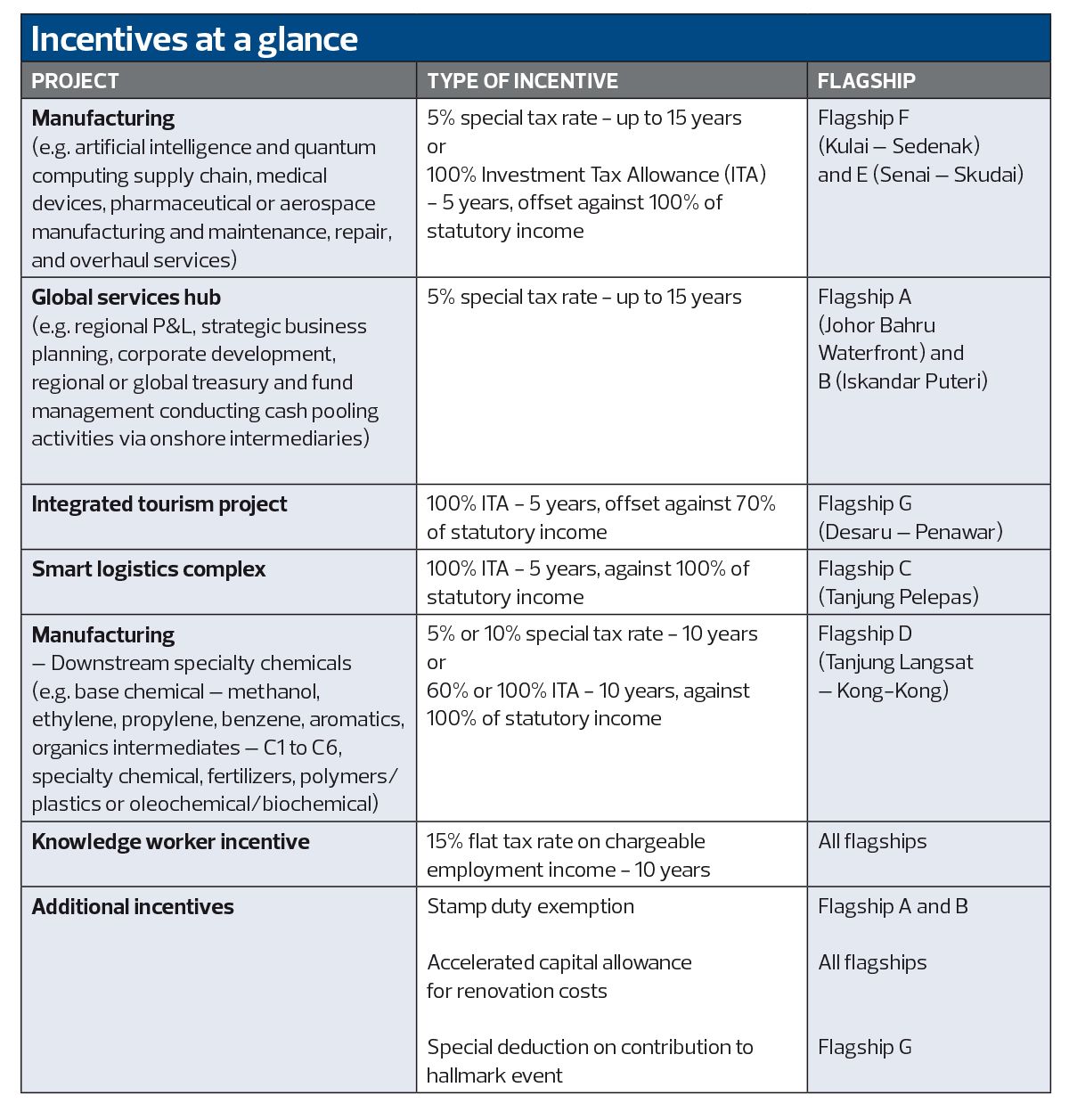
(Photo by Low Yen Yeing/The Edge)
This article first appeared in Forum, The Edge Malaysia Weekly on March 31, 2025 - April 6, 2025
The Johor-Singapore Special Economic Zone (JS-SEZ) is a major step forward in bilateral economic cooperation, providing businesses with a strategic gateway to high-value industry investments. A joint media release by the Ministry of Finance and the Johor government on Jan 8, followed by the Malaysian Investment Development Authority’s (Mida) publication of a tax incentive snapshot for the nine flagship areas within the JS-SEZ on Feb 3, outline the available benefits for investors (see table).
While the snapshot highlights key sectors such as manufacturing, global services, integrated tourism and logistics, it has yet to include details on other priority industries such as the digital economy, energy, education, healthcare and financial services. Further information on these sectors is expected in due course.
Maximising participation in JS-SEZ tax incentives
To fully capitalise on these incentives, investors should begin with a comprehensive feasibility study to assess eligibility under promoted projects and determine the most suitable flagship zone for their operations. Other critical considerations include business timelines — from site selection to operational commencement — along with legal and regulatory compliance, licensing requirements, tax implications, supply chain logistics and workforce strategies.
A well-structured investment plan is essential, incorporating detailed financial projections to determine the most suitable tax incentive scheme. Businesses should evaluate whether their operations are capital-intensive or geared toward rapid profitability as this will influence the choice between tax rate reductions and the investment tax allowance (ITA).
Regulatory authorities typically assess fixed asset investments, operational expenditure, project financing structures and workforce planning when reviewing applications. Given the outcome-based nature of these incentives, financial projections must be well-supported, data-driven and credible to align with regulatory expectations. A robust financial strategy not only enhances the likelihood of securing incentives but also ensures long-term business sustainability.
Beyond selecting the right tax incentive scheme, investors must also navigate compliance regulations to ensure continued eligibility and maximise returns.
Ensuring compliance and maximising returns
Meeting eligibility criteria and compliance conditions is crucial as non-compliance could result in disqualification or forfeiture of incentives after approval.
Investors should also evaluate capital expenditure requirements, particularly the eligibility of expenses incurred before submitting a tax incentive application as this can directly impact return on investment (ROI) and effective tax rates.
Certain incentives operate within a tiered framework, where access to higher-tier benefits may necessitate stricter compliance obligations. These may include commitments to local vendor development such as sourcing raw materials and machinery domestically or engaging local service providers, collaborations on research and development (R&D) with universities or research institutions and the creation of jobs and internship opportunities for Malaysian graduates. These requirements are designed to strengthen Malaysia’s industrial ecosystem, enhance global competitiveness, support the nation’s high-income aspirations and reinforce supply chain resilience.
Invest Malaysia Facilitation Centre Johor (IMFC-J): Streamlining approvals
The establishment of IMFC-J marks a significant step toward enhancing investment efficiency within the JS-SEZ. Serving as a centralised liaison, IMFC-J connects investors with key government agencies including Mida, the Iskandar Regional Development Authority, Invest Johor, the Inland Revenue Board of Malaysia, the Royal Malaysian Customs Department, the Immigration Department of Malaysia, the Department of Labour, Tenaga Nasional Bhd and Telekom Malaysia Bhd.
By reducing bureaucratic hurdles, IMFC-J facilitates expedited approvals for licences, tax incentives, employment passes and other operational requirements. It also ensures a seamless business setup and operational process by streamlining access to essential utilities including electricity, telecommunications, water and gas. As a one-stop coordination hub, IMFC-J significantly improves the ease of doing business within the JS-SEZ.
Application timeline and strategic planning
JS-SEZ tax incentives are open for applications submitted between Jan 1, 2025, and Dec 31, 2034. Investors must submit their applications via Mida’s Invest Malaysia portal, ensuring all required information and documentation are provided to prevent processing delays.
To maximise benefits, early planning is crucial. Businesses should familiarise themselves with procedural requirements, strategically structure their investments to align with JS-SEZ objectives, maintain compliance with regulatory frameworks and implement sound financial strategies to enhance eligibility and approval prospects.
As details on other priority industries and flagship zones become available, businesses should proactively monitor regulatory updates. A well-informed approach will enable investors to refine their strategies and fully capitalise on opportunities within the JS-SEZ framework.
Ng Fie Lih is an executive director of Johor-Tax at KPMG Malaysia
Save by subscribing to us for your print and/or digital copy.
P/S: The Edge is also available on Apple's App Store and Android's Google Play.
- Indonesia detains judge for alleged bribery in palm oil case involving Wilmar's unit
- Former Seberang Jaya assemblyman Dr Radin Muhamad Amin passes away
- Trump says he will provide more info on chips tariffs on Monday
- Malaysia to champion smallholder inclusion, sustainable trade at inaugural FACT 2025 Forum — plantation minister
- Japan doesn’t plan to use US Treasuries as tariff talk leverage

